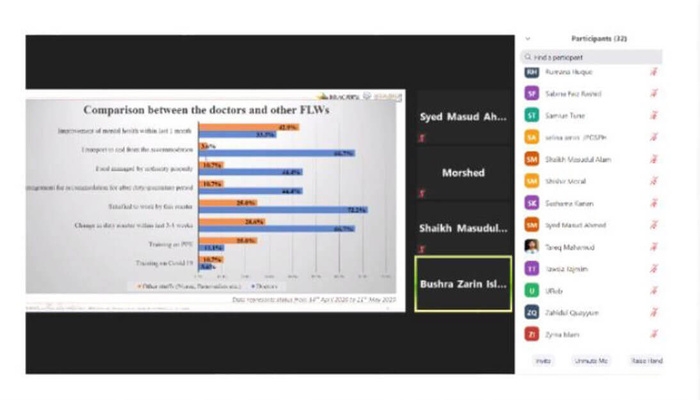

Bangladesh Health Watch (BHW), a citizens’ platform for improved accountability of country’s healthcare system through evidence based policy review and citizen feedback, recently conducted two research:
The findings of the research disseminated virtually on 20 June 2020. The session was moderated by Mushtaque Chowdhury, Convener BHW and the Divisional Advisors of COVID19, BHW working Group Members’ and a few Journalists were present among others. A total 32 participants were present at the event.
The findings of the research was presented by the lead researcher Professor Dr. Rumana Huque. The objectives of the research were to identify major areas of allocation and identify gaps, if any; to assess if allocations had been effective, efficient and transparent; and to draw out lessons learnt and implications for budget implementation. The period of the study was 1st January- 5th May, 2020. The study found that despite COVID-19 crisis, health sector remained neglected as a national priority. Out of the 18 stimulus packages announced by Bangladesh government (BDT 1,01,117 crore, 3.6% of GDP) the stimulus package for health (BDT 850 crore) represents 0.08% of total stimulus package.
Lack of comprehensive Covid management observed with less attention on long-term, coordinated and sustainable investments. Despite budgetary allocation, there had been delays in use of emergency fund and in many cases Bangladesh acted like `fire fighting’ and ‘ad-hoc’ basis. The typical bureaucratic and centralised model hampering the participation of all sectors of the society including NGOs. Lack of transparency and accountability in budget allocation and use also observed. The study recommended to increase budget allocation 3 – 4 percent of GDP for health sector and resource should be allocated based on comprehensive need assessment and an execution plan. While making any plan public health needs should be prioritised. Decentralization of decision making and improved transparency and accountability is key for proper resource utilization, as the study recommended.
How far has the situation improved in a month since the last survey: The findings of the research was presented by the member of the research team Dr. Bushra Zarin Islam. The original quick telephone survey was done to explore the perceptions and opinions of the FLWs regarding personal protection and safety while attending suspected/confirmed COVID-19 patients and this Re-interview was done to check whether, and to what extent, any change occurred in the areas of concerns expressed in the earlier study.
Total 46 respondents (out of 60 surveyed earlier) from 14 districts and 43 health facilities were interviewed over telephone in six days from 6 to 14 May 2020. 76% FLWs informed that they received PPE while in original study it was 75%. It is observed that only 19.6% FLWs training on PPE while it was 56.7% in the previous study. But among paramedics the percentage has increased 37.5% in May but it was 36.8 in April. Among those who PPE 56% found satisfied. Only overall 8.7% FLWs received training on management while it was 48.3% earlier. Besides PPE other observations are 80%post-graduate doctors were happy with the duty roaster and 24% FLWs informed that authority arranged accommodation at or near workplace for them. Transport and Food was managed by the authority for 28% and 24% respondents respectively, the study found. The study concluded that, the issues raised such as quantity and quality of PPEs supplied, trainings, measures to ease mental health of the FLWs etc. needs urgent attention from the decision-makers in order to have a grip on the current situation until it is too late.
Open discussion: Participants shared different comments and suggestion on the two research and beyond which are as follows:
Media coverage: The event got good media attention. At least 15 leading print and electronic media including Prothom Alo, The New Age, The Business Standard, The Bonik Barta published report on the event.
Citizen's Voice